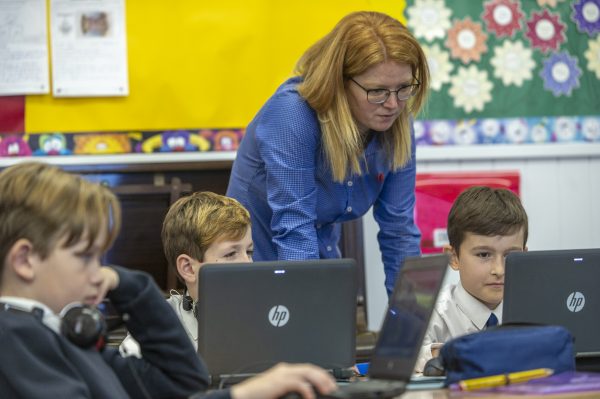Teaching at Dollar
What are the typical features of a Dollar Academy teacher? There are three common characteristics that apply to our teaching staff:
- Subject knowledge specialism
- Effective pedagogy based on research-informed practice
- Working with external bodies to develop expertise
We have more than 120 teachers on our staff covering ages 5-18, and we offer a wider range of subjects than any school in Scotland. So how can we ensure that our teachers are up to date with their professional practice?
Professional Learning
Firstly, we support teachers fully in developing their professional knowledge. To give one example of how we do this, take our in-service days (INSET). At most schools these are stand-alone days, with a ‘one-size fits all’ approach; a presentation to all staff on a common theme, irrespective of experience, interest or need. At Dollar, we do it differently. Our six INSETs form an ongoing programme of professional learning across the year. Each member of staff chooses a strand that addresses their needs.
This session, these strands cover:
- Coaching
- Digital Skills
- Leadership
- Mental health
- Practitioner Enquiry
- Responsive Assessment
- Support for Learning
The strands use the latest research-informed practice and provide tasks which allow teachers to apply what they learn to their classrooms. Theory is great, but it’s the application that matters.
We also take subject expertise very seriously. The Sutton Trust’s report ‘’What Makes Great Teaching?’ (2014) identified two factors are having the greatest impact on pupil attainment: teacher subject knowledge and the quality of instruction. We actively support our teachers to develop both of these aspects as far as possible.
Finally, all of our teachers are GTCS registered and undergo the Professional Update process every five years. We have a robust process of annual appraisal that was developed in collaboration with the GTCS.
Research-Informed Practice
Dollar teachers genuinely are experts at what they do. As a school we don’t buy into fads, and we don’t feel the need to continuously “innovate”. This is because we evaluate what we do, learn from current research, and are confident that what we do works well. We aim to base all our decisions about teaching and learning on evidence and experience rather than trends and buzzwords.
We back this up with a full CPD library. Reading is one of the most important, impactful and cost-effective ways of developing your pedagogy. We have almost one hundred titles by leading figures in education and we use these in our Professional Learning Reading Group.
We also have two committees which continuously evaluate what we are doing across the school. The Curriculum Committee looks at how joined up our courses are across the Prep, Junior and Senior schools. The IT Working Group looks at how we can use technology to enhance pupil learning rather than indulging in expensive gimmicks that have little impact on progress. On top of this, the Heads of Department regularly debate teaching and learning through the HGIOS4 framework (How Good Is Our School?).
Contributing to Scottish and International Education
We actively encourage our staff to be involved in educational initiatives outside of school because we believe this helps us understand how the world is changing around us. We also believe we have a responsibility not just to Dollar, but to Scottish education as a whole.
Our staff assist part time in various roles at the SQA. Several of our staff are involved in Initial Teacher Education (ITE) and supervise Masters’ programmes at universities. We also have staff who deliver In-service to other schools, speak at conferences, write for publications and blogs, work for local government and education charities. We are very much an outward-facing group of professionals who want to contribute to Scottish and international education.
So this is what we believe in, and what we expect of our teachers. No school is perfect, and no teacher is infallible. This is why Dylan Wiliam’s maxim is so true: the imperative to improve what we do is not a deficit model, it is a case of saying we can always be better. This professional curiosity lies at the heart of teaching and learning at Dollar Academy.







